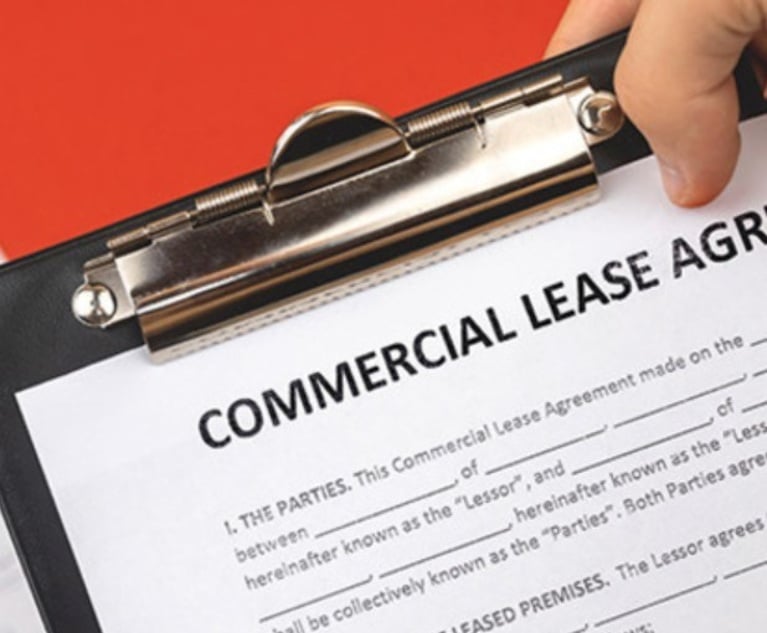Getting Out of Commercial Leases Under the New Bankruptcy Code
If a small business is a party to a lease that it wants to abandon, the Bankruptcy Code provides the company with the potential to avoid the legal obligations under this lease.
January 20, 2023 at 11:00 AM
5 minute read
 In major metropolitan areas, commercial office vacancies have skyrocketed and rents have plummeted. Tenants, required to examine their space needs post-pandemic, are eager to take advantage of the lower rents. A recent addition to the Bankruptcy Code provides these lessees with an opportunity to walk away from above-market leases.
In major metropolitan areas, commercial office vacancies have skyrocketed and rents have plummeted. Tenants, required to examine their space needs post-pandemic, are eager to take advantage of the lower rents. A recent addition to the Bankruptcy Code provides these lessees with an opportunity to walk away from above-market leases.
If a small business is a party to a lease that it wants to abandon, the Bankruptcy Code provides the company with the potential to avoid the legal obligations under this lease. After filing for bankruptcy under Chapter 11, the reorganization section, the company may reject (breach) the lease. In return, the landlord/creditor receives a damage claim resulting from the lease rejection payable pro rata with other creditors. So far, so good.
Unfortunately, Chapter 11's high costs and complexities make it difficult for small businesses to successfully reorganize this way. Although the Chapter 11 debtor keeps control of its operations, the company is subject to significant supervision by the bankruptcy court.
This content has been archived. It is available through our partners, LexisNexis® and Bloomberg Law.
To view this content, please continue to their sites.
Not a Lexis Subscriber?
Subscribe Now
Not a Bloomberg Law Subscriber?
Subscribe Now
NOT FOR REPRINT
© 2025 ALM Global, LLC, All Rights Reserved. Request academic re-use from www.copyright.com. All other uses, submit a request to [email protected]. For more information visit Asset & Logo Licensing.
You Might Like
View All
'A Shock to the System’: Some Government Attorneys Are Forced Out, While Others Weigh Job Options
7 minute read
'Serious Legal Errors'?: Rival League May Appeal Following Dismissal of Soccer Antitrust Case
6 minute read
How Some Elite Law Firms Are Growing Equity Partner Ranks Faster Than Others
4 minute read
Law Firms Mentioned
Trending Stories
- 1Federal Laws Also Preempt State's Swipe Fee Law on Out-of-State Banks, Judge Rules
- 2Judge Grills DOJ on Trump’s Birthright Citizenship Executive Order
- 3Exceptional Growth Becoming the Rule? Demand and Rate Hikes Drove Strong Year for Big Law
- 4Dentons Taps D.C. Capital Markets Attorney for New US Managing Partner
- 5Auto Dealers Ask Court to Pump the Brakes on Scout Motors’ Florida Sales
Who Got The Work
J. Brugh Lower of Gibbons has entered an appearance for industrial equipment supplier Devco Corporation in a pending trademark infringement lawsuit. The suit, accusing the defendant of selling knock-off Graco products, was filed Dec. 18 in New Jersey District Court by Rivkin Radler on behalf of Graco Inc. and Graco Minnesota. The case, assigned to U.S. District Judge Zahid N. Quraishi, is 3:24-cv-11294, Graco Inc. et al v. Devco Corporation.
Who Got The Work
Rebecca Maller-Stein and Kent A. Yalowitz of Arnold & Porter Kaye Scholer have entered their appearances for Hanaco Venture Capital and its executives, Lior Prosor and David Frankel, in a pending securities lawsuit. The action, filed on Dec. 24 in New York Southern District Court by Zell, Aron & Co. on behalf of Goldeneye Advisors, accuses the defendants of negligently and fraudulently managing the plaintiff's $1 million investment. The case, assigned to U.S. District Judge Vernon S. Broderick, is 1:24-cv-09918, Goldeneye Advisors, LLC v. Hanaco Venture Capital, Ltd. et al.
Who Got The Work
Attorneys from A&O Shearman has stepped in as defense counsel for Toronto-Dominion Bank and other defendants in a pending securities class action. The suit, filed Dec. 11 in New York Southern District Court by Bleichmar Fonti & Auld, accuses the defendants of concealing the bank's 'pervasive' deficiencies in regards to its compliance with the Bank Secrecy Act and the quality of its anti-money laundering controls. The case, assigned to U.S. District Judge Arun Subramanian, is 1:24-cv-09445, Gonzalez v. The Toronto-Dominion Bank et al.
Who Got The Work
Crown Castle International, a Pennsylvania company providing shared communications infrastructure, has turned to Luke D. Wolf of Gordon Rees Scully Mansukhani to fend off a pending breach-of-contract lawsuit. The court action, filed Nov. 25 in Michigan Eastern District Court by Hooper Hathaway PC on behalf of The Town Residences LLC, accuses Crown Castle of failing to transfer approximately $30,000 in utility payments from T-Mobile in breach of a roof-top lease and assignment agreement. The case, assigned to U.S. District Judge Susan K. Declercq, is 2:24-cv-13131, The Town Residences LLC v. T-Mobile US, Inc. et al.
Who Got The Work
Wilfred P. Coronato and Daniel M. Schwartz of McCarter & English have stepped in as defense counsel to Electrolux Home Products Inc. in a pending product liability lawsuit. The court action, filed Nov. 26 in New York Eastern District Court by Poulos Lopiccolo PC and Nagel Rice LLP on behalf of David Stern, alleges that the defendant's refrigerators’ drawers and shelving repeatedly break and fall apart within months after purchase. The case, assigned to U.S. District Judge Joan M. Azrack, is 2:24-cv-08204, Stern v. Electrolux Home Products, Inc.
Featured Firms
Law Offices of Gary Martin Hays & Associates, P.C.
(470) 294-1674
Law Offices of Mark E. Salomone
(857) 444-6468
Smith & Hassler
(713) 739-1250






